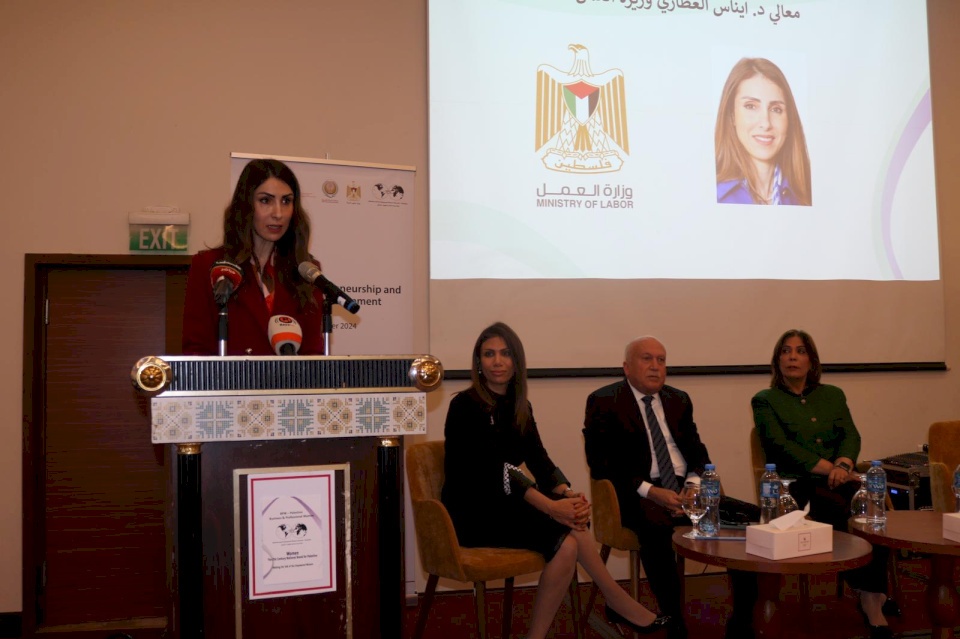
Minister of Labor Affirms the Importance of Supporting and Strengthening Farmers' Resilience and Empowering Cooperatives in the Jordan Valley
SadaNews - Minister of Labor Einas Al-Atari reviewed the projects of the production association at the Agricultural Cooperative Association for Livestock in the village of Aqaba in Tubas Governorate.
During her visit to the association, Al-Atari confirmed that this visit is part of the Ministry of Labor's efforts to promote and develop the cooperative sector to create new job opportunities to empower youth and women in the labor market.
She also learned about the services provided to support farmers' resilience and facilitate their daily work in accordance with the needs of rural communities, as well as the challenges faced by the dairy and cheese factory affiliated with the association, which operates entirely on electricity generated from solar cells. This has helped alleviate the burden of electricity charges, as well as the stages of cheese and milk production and its role in solving the issue of marketing milk products, organizing the production process, and commending the efforts made by the association to empower youth and women in the labor market.
As part of her visit to Tubas Governorate, the Minister of Labor chaired a meeting of the Local Employment Council with 25 members, attended by Governor Ahmed Al-As'ad, as part of the ministry’s efforts to enhance employment policies and improve the working environment in the governorate.
Al-Atari emphasized that employment councils have become one of the most important tools of coordination between the Ministry of Labor and local community institutions, as well as the public and private sectors. She stressed the "importance of collective work and institutional integration in improving the reality of employment and vocational training, especially in agricultural governorates, led by Tubas, which is characterized by its agricultural nature and promising human resources."
She pointed to the challenges facing the Palestinian labor market, the most prominent of which are the high unemployment rates, especially among youth and women, and the weak alignment between educational outcomes and market needs. Therefore, the ministry prioritized the promotion of decent and sustainable job opportunities through comprehensive programs that combine self-employment, vocational training, and entrepreneurial empowerment.
She added that the ministry has worked in recent times to implement several national projects and operational programs targeting the most affected groups, including the "Bader" program to support workers affected by providing zero-interest loans to support their existing projects or to establish new projects, as well as the "Employment Services" project, which provided temporary job opportunities for youth and graduates, and the interest-free loan program to finance small projects and entrepreneurial ideas, in addition to programs aimed at supporting women and youth in entrepreneurial, agricultural, and cooperative fields.
Al-Atari noted that the ministry's directorates in various governorates continue their regulatory and organizational role in protecting workers' rights and improving the work environment through inspection team tours and addressing labor issues and resolving disputes, along with implementing intensive activities in occupational safety and health to ensure that establishments comply with laws and promote a culture of decent work.
She confirmed the vital role played by local employment councils, which are essential partners in designing and implementing programs that consider the specificities and developmental needs of each governorate, contributing to directing employment policies towards the groups most in need of support, through partnerships with all national and international entities to enhance self-employment, integrate vulnerable groups into the labor market, especially women, youth, and people with disabilities, in order to provide decent work, social protection, quality training, and promote a spirit of leadership and creativity, leading to economic and social development.
For his part, Al-As'ad confirmed that the Ministry of Labor is a key partner in supporting employment efforts within the governorate through its programs aimed at youth, women, and marginalized groups, indicating that the continued cooperation between the governorate and the ministry forms a solid foundation for developing operational initiatives that align with the agricultural nature of the governorate, and the importance of the Employment Council in Tubas as it contributes to coordinating efforts and enhancing integration between institutions to meet the needs of our people in the governorate and strengthen their resilience on their land.
The executive director of the Tubas Sports Club, Hazem Salahat, reviewed the achievements of the Local Employment Council in the governorate, through the operational projects for youth and women being implemented, most notably the Recovery Program, the Makhni Project, and the Horizons 3 Project. He also pointed to the obstacles facing the council and joint work mechanisms with various partners to overcome the challenges in order to provide sustainable job opportunities that meet the needs of the governorate.
The administrative director of the Tubas Electricity Company, Omar Muhasnah, praised the strategic relationship with the Ministry of Labor, pointing out the cooperation in organizing labor contracts and the organizational structure of the company, and securing its workers, as well as the collaboration in the fields of inspection and occupational safety and health, and the role of inspection teams in raising the level of compliance in workplaces, and enhancing occupational awareness to protect workers in this vital sector. A plan has been prepared in coordination with the Tubas Labor Directorate that includes training the company's technicians in first aid in cooperation with the Palestinian Red Crescent and implementing a joint training plan for university students in fields related to the company's work and the occupational hazards they may face during fieldwork.

The Central Elections Commission Announces the Closure of Candidacy for the 2026 Local Ele...

Election Committee: The nomination period for local bodies closes today at 2 PM

Weather: A Slight Increase in Temperatures

Government Communication Monitors Key Interventions Implemented by the Government Last Wee...

"Crossings and Borders": Al-Karama Crossing Continues Operation as Usual with Possible Cha...

Occupation continues to tighten its military measures in the West Bank governorates

Currency Exchange Rates Against the Shekel on Sunday (March 1)

